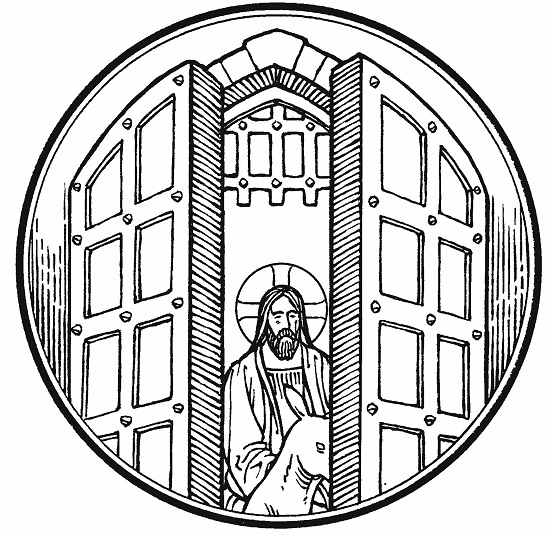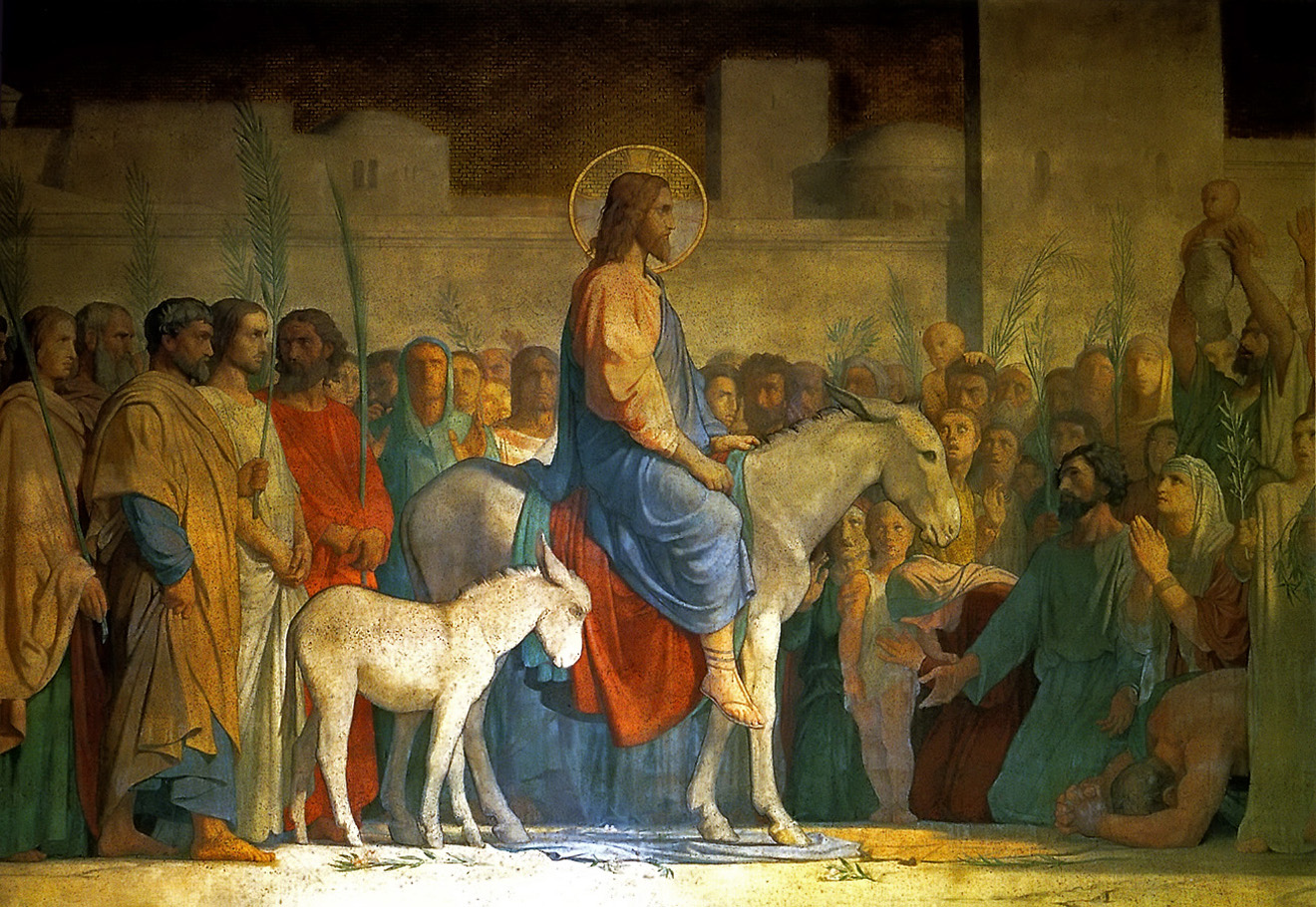~ Ad Te Levavi ~
Readings: Jeremiah 23:5-8 | Romans 13:8-14 | Matthew 21:1-9
Text: Matthew 21:1-9
“Your King Comes to You”
This is the beginning of Advent, the season leading up to Christmas. This word, Advent, is handed down to us from generations of Christians before us. It means, “to come to” (ad + venire), It’s about Christ’s coming—first to save His people from their sin, and again at the Last when He “will appear a second time, not to deal with sin but to save those who are eagerly waiting for Him” (Heb. 9:28)

5 “Say to the daughter of Zion,
‘Behold, your king is coming to you,
humble, and mounted on a donkey,
on a colt, the foal of a beast of burden.’ ”
Behold says Zechariah. Wake up! Pay attention! Why? Because your King is coming. He alone shall reign among you. What does it mean to have a king when we live in a democratic republic? We did not choose Him, but He was given to us.
Christ alone is your king, not Moses with his law. Sin, death, and the devil are not your master. Let none but Christ your Master be. All these tyrants who have long plagued you are vanquished by your King, Jesus.
Jesus alone is chosen, promised, and sent by God to you. He has purchased and won you.
He came in this way because He is King—more than a personal King, but King of Creation. Above His cross, He bore the inscription, “Jesus of Nazareth, King of the Jews,” but He is so much more. It would simply be a tragedy if Jesus came as the rightful King of the Jews, they didn’t receive Him and rather crucified Him. But in fact by their rejection, God established His reign, so that after He rose from breaking the power of His enemies, He proclaims, “All authority in heaven and on earth has been given to Me.” (Matt. 28:18)

What sort of King He is
He is not an earthly ruler of an earthly kingdom. He is a spiritual King whose Kingdom is one of faith (yet one day of sight). The Jews had it wrong when they heard of God’s Messiah coming as King. They heard terms like kingdom, land, and Zion, and they were confined to merely physical interpretations. Right before His ascension, the disciples still asked Him, “Lord, will you at this time restore the kingdom to Israel?” (Acts 1:6) By which they meant, are you going to set up a nation state, establish a worldly government, choose people to be your “right hand man” and so forth. Some false teachers even still say that Christ will come to establish an earthly kingdom in a “golden age” for a 1,000 years. But if we listen to all of Scripture, and to Christ Himself, it’s clear this is not how He reigns.
We are at a severe disadvantage to think of the Kingdom, of Zion, of Israel, and our King in merely earthly ways. He is God, so His reign extends not borders found on a map but extends over the whole universe—“He upholds all things by the Word of His power.” (Heb. 1:3) His Zion is not merely a special name for the earthly city Jerusalem, but for His dwelling in the midst of His holy people—“For the Lord has chosen Zion; he has desired it for his dwelling place: “This is my resting place forever; here I will dwell, for I have desired it.” (Ps. 132:13-14) His Israel is not the blood descendants of the patriarch Jacob, for “All who receive him, who believed in his name, he gave the right to become children of God, 13 who were born, not of blood nor of the will of the flesh nor of the will of man, but of God.” (John 1:12-13)
At Jesus’ entry into the city Jerusalem, it was expected that He was an earthly king, for He was riding in as Solomon, the natural son of David (1 Kings 1:44). Yet, it was soon clear that His reign would not be a continuation of King Solomon. God raised Him up, not to a dazzling throne with fanfare. The shouts of Hosanna quickly came to a close. Instead of a gold-clad throne, He was raised up to reign from the tree of the cross. The justice He established was the “temporal death and eternal punishment” that we “justly deserve.”[1] The righteousness He established was the sinless, obedient heart and life that no son of Adam could do. He was indeed righteous and having salvation, as Zechariah foretold (Zech. 9:9). But what earthly King could do this for His subjects? As the King of the Jews breathed His last and was laid in the tomb, it became all too clear that His reign would not be limited to Jerusalem.

How He reigns
Among earthly rulers, you find power, politics, sway, and even corruption. Not so with King Jesus. He comes “humble and mounted on a donkey.” He comes not to be served but to serve and give His life as a ransom for many (Matt. 20:28) He comes not with threats of condemnation but with words of comfort for the broken, the sinful, those “harassed and helpless, like sheep without a shepherd.” (Matt. 9:36)
That is how He still comes, in humble means, as a servant-King. He brings people into His Kingdom, under His reign, not by coercion and threats, but by His humble, yet powerful Word. He doesn’t display His power in mighty acts of destruction, but in the peaceful fruit of sins forgiven and the hope of eternal life. He nourishes His people, not with glorious power to overcome every obstacle, but with His crucified and risen Body and Blood. All this so that His power might be perfected in our weakness (2 Cor. 12:9).
Indeed, the Day is coming when He will come in power, but now is the day for His Kingdom to grow. We often grow impatient with His ways, but He who knows the hearts of all also knows what truly “work” to extend His reign. When we’re surrounded by businesses and churches-modeled-after-consumerism that seem to thrive we grow envious of their visible success. But if we are to be faithful to our Lord, we too remain humble servants, waiting to be exalted by our God.

Why He Comes
Lastly, we consider why He comes. It might occur to us that we get by just fine without a King. But who is able to face the Judgment Day without fear? King Jesus intercedes for you. Who is able to face the spiritual warfare that would deceive us, make us complacent in our sins, and drag us ignorantly to hell? King Jesus is able to loose our chains and fight for us. Which one of us can do battle with death and overcome? King Jesus comes to give you His victory over the grave!
The crowds who saw Jesus coming into Jerusalem cried, “Hosanna!” This wasn’t just praise for Him. It’s a cry that means, “Save us, we pray!” So that cry is still on our lips every week. Our King comes to us with His victory, His intercession, and the victorious host, and gives it all to us His Body and Blood. That continues to be our cry, “Hosanna!” and He answers us with His might!
He purchased and won you from sin, death, and the power of the devil, not with gold or silver, but with His holy precious blood and innocent suffering and death. He did all this so that you would belong to Him and live with Him and serve Him in His Kingdom. In this life, that Kingdom may not look like much—it is sometimes hard and painful, take sacrifice, even cost you your life—but it is a Kingdom which endures beyond time, gives victory over death, and promises you eternal prosperity and blessing from God.
Behold, daughter of Zion, who are the faithful of God in this place, your King is coming to you, and God grant you to receive Him. Amen!

[1] Lutheran Service Book, p 184




